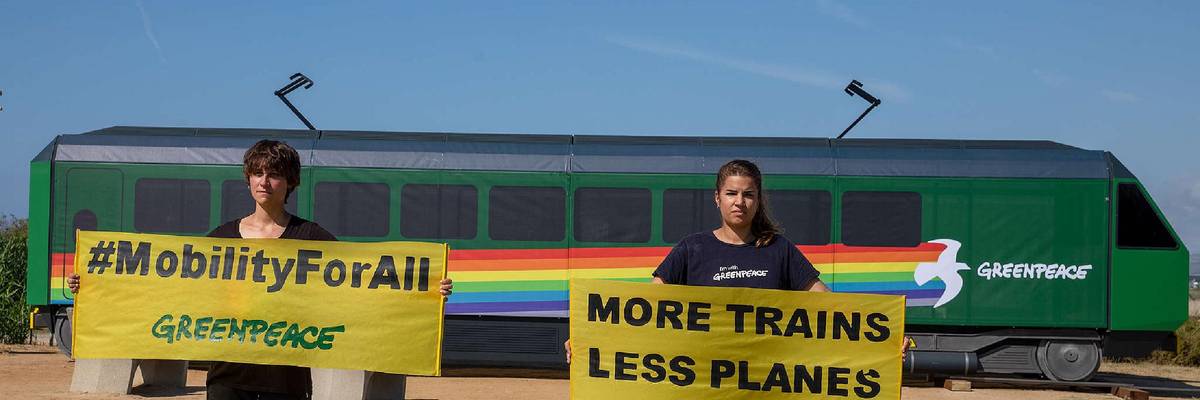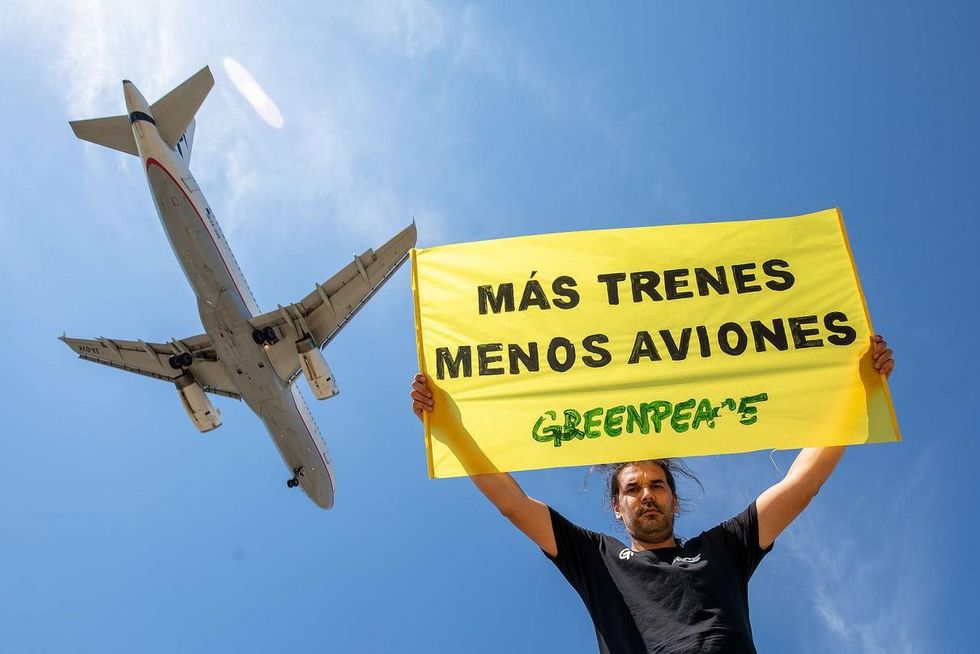

SUBSCRIBE TO OUR FREE NEWSLETTER
Daily news & progressive opinion—funded by the people, not the corporations—delivered straight to your inbox.
5
#000000
#FFFFFF
To donate by check, phone, or other method, see our More Ways to Give page.


Daily news & progressive opinion—funded by the people, not the corporations—delivered straight to your inbox.

Greenpeace is demanding that European governments invest in an accessible railway system for all. The campaign got off to a 'flying' start with anti-expansion action at El Prat Airport. (Photo: Pablo Blazquez/Greenpeace)
Earlier this month, activists from Greenpeace Spain installed a 12-meter long train model in the Barcelona-El Prat Airport to protest the impact of the airline sector and the planned expansion of the airport.
The expansion of the Barcelona-El Prat Airport would cause tremendous damage to precious wetlands and cost 1.7 million euros. Businesses and representatives promoting this project would like people to believe that opposing the expansion will hurt the city and its inhabitants. It is not true. No city can prosper based exclusively on a "low cost" tourism model that negatively impacts the population with more expensive rents while devouring public resources.
This train model was designed to highlight the shocking lack of rail connectivity among European countries and across the continent. It will travel across Europe in the coming months.
Why it matters
With the arrival of summer in Europe, the easing of restrictions means a return to travel throughout the continent. However, of the people who are lucky enough to be able to travel, many folks have no choice but to resort to the car or plane for their vacations due to the lack of trains. We urgently need European governments to invest in a geographically robust and accessible railway system for everyone everywhere, not just those routes with the highest demand.
In Eastern and Northern Europe, for example, distances are big and alternatives still need to be designed and delivered. If Europe truly wants to be united, train travel time between places like Bucharest (Romania) and Sofia (Bulgaria), the capitals of the two largest countries in Eastern Europe, should be five hours, not 11 hours with multiple transfers.
Investing in trains is a key to fighting the climate emergency while connecting Europeans and other travelers with their cities and countries in a sustainable way. But diminishing connections has forced people to use more polluting means of transport.

Earlier this month, activists from Greenpeace Spain protested the planned expansion of the airport. (Photo: Pablo Blazquez/Greenpeace)
What needs to happen
The European Commission has declared 2021 the "European Year of Rail," highlighting the essential role of the train in fighting the climate crisis. Traveling by plane pollutes up to 20 times more than traveling by train. Greenpeace demands that E.U. institutions and national governments be consistent with their climate objectives and promote a system whereby the train--already climate-friendly, safe--is an affordable alternative to short-haul flights and the car.
With that in mind, Greenpeace Spain produced a video to encourage citizens to sign a petition addressed to European Transport Ministers with five proposals that would allow us to travel better in the future:
Mobility For All is working in collaboration with allies to promote the benefits of alternative mobility for improved city life for all city dwellers, whatever their background or socioeconomic status.
Dear Common Dreams reader, The U.S. is on a fast track to authoritarianism like nothing I've ever seen. Meanwhile, corporate news outlets are utterly capitulating to Trump, twisting their coverage to avoid drawing his ire while lining up to stuff cash in his pockets. That's why I believe that Common Dreams is doing the best and most consequential reporting that we've ever done. Our small but mighty team is a progressive reporting powerhouse, covering the news every day that the corporate media never will. Our mission has always been simple: To inform. To inspire. And to ignite change for the common good. Now here's the key piece that I want all our readers to understand: None of this would be possible without your financial support. That's not just some fundraising cliche. It's the absolute and literal truth. We don't accept corporate advertising and never will. We don't have a paywall because we don't think people should be blocked from critical news based on their ability to pay. Everything we do is funded by the donations of readers like you. Will you donate now to help power the nonprofit, independent reporting of Common Dreams? Thank you for being a vital member of our community. Together, we can keep independent journalism alive when it’s needed most. - Craig Brown, Co-founder |
Earlier this month, activists from Greenpeace Spain installed a 12-meter long train model in the Barcelona-El Prat Airport to protest the impact of the airline sector and the planned expansion of the airport.
The expansion of the Barcelona-El Prat Airport would cause tremendous damage to precious wetlands and cost 1.7 million euros. Businesses and representatives promoting this project would like people to believe that opposing the expansion will hurt the city and its inhabitants. It is not true. No city can prosper based exclusively on a "low cost" tourism model that negatively impacts the population with more expensive rents while devouring public resources.
This train model was designed to highlight the shocking lack of rail connectivity among European countries and across the continent. It will travel across Europe in the coming months.
Why it matters
With the arrival of summer in Europe, the easing of restrictions means a return to travel throughout the continent. However, of the people who are lucky enough to be able to travel, many folks have no choice but to resort to the car or plane for their vacations due to the lack of trains. We urgently need European governments to invest in a geographically robust and accessible railway system for everyone everywhere, not just those routes with the highest demand.
In Eastern and Northern Europe, for example, distances are big and alternatives still need to be designed and delivered. If Europe truly wants to be united, train travel time between places like Bucharest (Romania) and Sofia (Bulgaria), the capitals of the two largest countries in Eastern Europe, should be five hours, not 11 hours with multiple transfers.
Investing in trains is a key to fighting the climate emergency while connecting Europeans and other travelers with their cities and countries in a sustainable way. But diminishing connections has forced people to use more polluting means of transport.

Earlier this month, activists from Greenpeace Spain protested the planned expansion of the airport. (Photo: Pablo Blazquez/Greenpeace)
What needs to happen
The European Commission has declared 2021 the "European Year of Rail," highlighting the essential role of the train in fighting the climate crisis. Traveling by plane pollutes up to 20 times more than traveling by train. Greenpeace demands that E.U. institutions and national governments be consistent with their climate objectives and promote a system whereby the train--already climate-friendly, safe--is an affordable alternative to short-haul flights and the car.
With that in mind, Greenpeace Spain produced a video to encourage citizens to sign a petition addressed to European Transport Ministers with five proposals that would allow us to travel better in the future:
Mobility For All is working in collaboration with allies to promote the benefits of alternative mobility for improved city life for all city dwellers, whatever their background or socioeconomic status.
Earlier this month, activists from Greenpeace Spain installed a 12-meter long train model in the Barcelona-El Prat Airport to protest the impact of the airline sector and the planned expansion of the airport.
The expansion of the Barcelona-El Prat Airport would cause tremendous damage to precious wetlands and cost 1.7 million euros. Businesses and representatives promoting this project would like people to believe that opposing the expansion will hurt the city and its inhabitants. It is not true. No city can prosper based exclusively on a "low cost" tourism model that negatively impacts the population with more expensive rents while devouring public resources.
This train model was designed to highlight the shocking lack of rail connectivity among European countries and across the continent. It will travel across Europe in the coming months.
Why it matters
With the arrival of summer in Europe, the easing of restrictions means a return to travel throughout the continent. However, of the people who are lucky enough to be able to travel, many folks have no choice but to resort to the car or plane for their vacations due to the lack of trains. We urgently need European governments to invest in a geographically robust and accessible railway system for everyone everywhere, not just those routes with the highest demand.
In Eastern and Northern Europe, for example, distances are big and alternatives still need to be designed and delivered. If Europe truly wants to be united, train travel time between places like Bucharest (Romania) and Sofia (Bulgaria), the capitals of the two largest countries in Eastern Europe, should be five hours, not 11 hours with multiple transfers.
Investing in trains is a key to fighting the climate emergency while connecting Europeans and other travelers with their cities and countries in a sustainable way. But diminishing connections has forced people to use more polluting means of transport.

Earlier this month, activists from Greenpeace Spain protested the planned expansion of the airport. (Photo: Pablo Blazquez/Greenpeace)
What needs to happen
The European Commission has declared 2021 the "European Year of Rail," highlighting the essential role of the train in fighting the climate crisis. Traveling by plane pollutes up to 20 times more than traveling by train. Greenpeace demands that E.U. institutions and national governments be consistent with their climate objectives and promote a system whereby the train--already climate-friendly, safe--is an affordable alternative to short-haul flights and the car.
With that in mind, Greenpeace Spain produced a video to encourage citizens to sign a petition addressed to European Transport Ministers with five proposals that would allow us to travel better in the future:
Mobility For All is working in collaboration with allies to promote the benefits of alternative mobility for improved city life for all city dwellers, whatever their background or socioeconomic status.